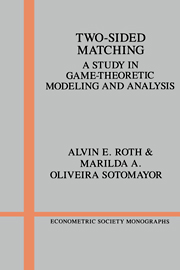Book contents
- Frontmatter
- Chapter 1 Introduction
- Part I One-to-one Matching: the Marriage Model
- Part II Many-to-one matching: models in which firms may employ many workers
- Chapter 5 The college admissions model and the labor market for medical interns
- Chapter 6 Discrete models with money, and more complex preferences
- Part III Models of one-to-one matching with money as a continuous variable
- Part IV Epilogue
- Bibliography
- Name Index
- Subject index
Chapter 6 - Discrete models with money, and more complex preferences
from Part II - Many-to-one matching: models in which firms may employ many workers
Published online by Cambridge University Press: 05 January 2013
- Frontmatter
- Chapter 1 Introduction
- Part I One-to-one Matching: the Marriage Model
- Part II Many-to-one matching: models in which firms may employ many workers
- Chapter 5 The college admissions model and the labor market for medical interns
- Chapter 6 Discrete models with money, and more complex preferences
- Part III Models of one-to-one matching with money as a continuous variable
- Part IV Epilogue
- Bibliography
- Name Index
- Subject index
Summary
This chapter looks at models of many-to-one matching between firms and workers that generalize the college admissions model in two important ways, by allowing firms to have a larger class of preferences over groups of workers, and by explicitly putting money into the model, so salaries are determined as part of the outcome of the game, rather than specified in the model as part of the job description. Of course, when we look at a model that does both these things together, we will also have to specify how the preferences of firms and workers deal with different combinations of job assignments and wages. Section 6.2 considers a version of a model proposed by Kelso and Crawford, with both complex preferences and negotiated wages. (We model wages here as a discrete variable, which is a natural modeling assumption since, for example, contracts cannot specify wages more closely than to the nearest penny. The next chapters model wages as a continuous variable, which also has some advantages.) But first we construct a simpler model in which we can examine complex preferences while continuing to treat salaries as an implicit part of the job description. Throughout this chapter we continue to make the simplifying assumption that workers are indifferent to which other workers are employed by the same firm.
Information
- Type
- Chapter
- Information
- Two-Sided MatchingA Study in Game-Theoretic Modeling and Analysis, pp. 171 - 186Publisher: Cambridge University PressPrint publication year: 1990
